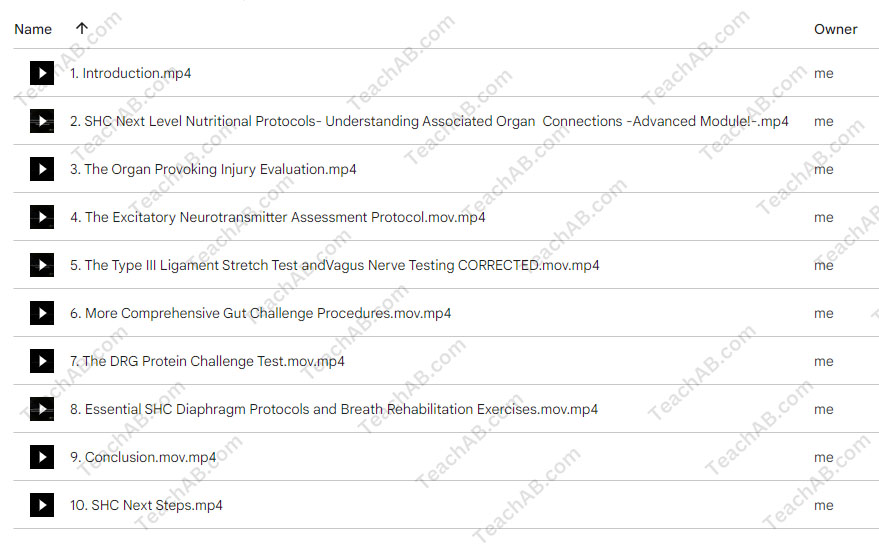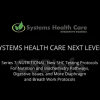Systems Health Care Next Level – Series 7 By Stephen Gangemi
$525.00 Original price was: $525.00.$93.00Current price is: $93.00.
Systems health care next level – series 7 by Stephen Gangemi – Immediate Download!
Let See The Content Inside This Course:

Description:
Stephen Gangemi’s “Systems Health Care Next Level – Series 7” provides a ray of hope in the rapidly changing field of healthcare, where the body’s complexities tell hidden tales and symptoms frequently conceal more serious issues. This series illuminates the art and science of holistic health by delving deeply into the interdependencies of bodily systems. It is more than just an instructional resource.
The series carefully explores cutting-edge procedures and tests intended to promote a sophisticated understanding of the body, and it is aimed at practitioners who are enthusiastic about natural health. We’ll learn more about the concepts and methods Dr. Gangemi offers, and how this series has the potential to change the way we approach healthcare in ways that balance the intricate stories of our bodies.

The Significance of Dietary Guidelines
A strong focus on dietary guidelines is at the core of the series. Dr. Gangemi supports a thorough understanding of the relationships between organs and their corresponding nutritional needs rather than taking a one-size-fits-all approach. This is similar to a symphony in that for the music to be successful, every instrument must harmonize with the others. For practitioners, this entails reaching new heights in the art of dietary intervention.
Key Insights from the Nutritional Protocols Segment
- Interconnectedness of Organs: Recognizing that the liver, kidneys, and gut are not isolated entities but rather players in a grander narrative. Understanding how nutritional deficiencies in one organ can adversely affect others is crucial.
- Tailored Dietary Interventions: Gone are the days when generic dietary recommendations sufficed. Now, practitioners can approach each patient with a tailored strategy based on their specific organ interactions.
- The Goal of Nutritional Strategies: To not only heal but also empower individuals with knowledge, ensuring they understand how their choices affect their own health.
By grounding these insights in current research, Dr. Gangemi draws from studies that illustrate the importance of specific micronutrients and their role in optimizing health, such as vitamin D’s profound effect on both bone health and immune response.
Thorough Injury Assessments
In the medical field, injuries usually require a simple evaluation: Did an injury occur? How much agony is there? But the series takes a far more comprehensive approach to injury evaluations. Dr. Gangemi offers a thorough framework for assessing injuries, emphasizing the need of comprehending the ways in which various body systems affect and are related to pain and healing.
Key Components of Injury Evaluation
- Holistic Assessment: Instead of treating the injury as a standalone issue, practitioners are taught to consider the entire body, highlighting how compensation can lead to further complications.
- Cross-System Evaluation: For instance, evaluating a knee injury not only involves looking at the joint but also assessing the hip and ankle to ensure that all interconnected systems are functioning effectively.
- Integrating Mind and Body: Beyond physical injuries, emotional and psychological factors are also vital as they can influence healing processes.
These principles draw insights from interdisciplinary research highlighting the psychological aspects of pain and injury recovery, thus encouraging a more holistic vantage point in practice.
Evaluations of Neurotransmitters
The study of neurotransmitter evaluations is safely tucked away within the series’ structure. This section gives practitioners the essential skills they need to recognize and address biochemical imbalances that may be causing a number of health issues, with a special emphasis on the function of excitatory neurotransmitters.
Understanding Neurotransmitter Imbalances
- Identifying Symptoms: Practitioners learn to correlate specific symptoms with neurotransmitter imbalances. For example, low levels of serotonin may contribute to depression, while imbalances in glutamate could be linked to anxiety.
- Innovative Assessment Techniques: With advanced techniques like urine and saliva testing, the series equips health care providers with the means to effectively assess and tackle these imbalances.
- Treatment Strategies: Armed with this knowledge, practitioners can develop targeted treatment strategies that may include supplements, dietary changes, or lifestyle adjustments.
Research findings illustrate the crucial link between neurotransmitter imbalances and mental health, emphasizing the role of nutrition and lifestyle in maintaining equilibrium.
Ligament and Nerve Testing Techniques
Exploring the physical aspects of health, the series delves into ligament and nerve testing techniques. In a landscape where physical evaluations often fall short of their potential, Dr. Gangemi introduces methods such as the Type III ligament stretch test and vagus nerve testing to deepen understanding.
Advanced Testing Techniques Explained
- Type III Ligament Stretch Test: This technique offers practitioners a sophisticated method for assessing ligament integrity and how it impacts surrounding muscles and joints.
- Vagus Nerve Testing: By examining the vagus nerve, practitioners can gain insights into how stress levels and overall health impact bodily functions, from digestion to heart rate.
- Integration with Other Assessments: The techniques discussed reinforce how a combination of various assessments can lead to improved patient outcomes, transforming how practitioners approach evaluations.
Such methodologies are not only grounded in practical application; they also incorporate research that corroborates their effectiveness, thus providing practitioners with the tools they need for thorough evaluations.
Gut Challenge Procedures
In a world increasingly obsessed with gut health, the gut challenge procedures illuminated in the series stand as a testament to the gastrointestinal system’s overarching importance in overall health. Dr. Gangemi empowers practitioners with an arsenal of techniques aimed at understanding gut dynamics.
Key Aspects of Gut Health Emphasized
- Understanding Gut Dysbiosis: Practitioners are educated about the signs of dysbiosis and its far-reaching implications on health, from autoimmune conditions to mental health disorders.
- Procedure Essentials: Detailed procedures outlined in the series guide professionals through assessing gut health effectively. Procedures could include specific dietary challenges or enzyme assessments.
- Empowerment Through Education: The series emphasizes educating patients on gut health, providing insight into how dietary choices can influence their overall well-being.
Research continually supports the gut-brain connection, where disturbances in gut health have been linked to various neurological disorders. This growing field highlights the trailblazing work of Dr. Gangemi as he leads practitioners into a new era of health care methodologies.
The Interconnected Systems Approach
The shc approach, as delineated by Dr. Gangemi, is not just about treating ailments but understanding that health issues are often interconnected and deserve a systematic, individualized focus. This core philosophy acts as a thread weaving through all concepts introduced in the series.
Fundamental Principles of the SHC Approach
- Systematic Treatment: Health issues should be examined through a lens that considers the entire body system rather than isolated parts.
- Individualized Care Plans: Each patient presents a unique tapestry of health challenges, and tailoring care plans according to individual needs amplifies the efficacy of treatment.
- Holistic Understanding of Health: Health is more than the absence of disease; it incorporates the emotional, psychological, and physical dimensions of an individual.
Research has consistently shown that holistic and integrative approaches to health care yield better patient outcomes, making this series a vital resource for practitioners aiming to adopt such methodologies.
Conclusion
Stephen Gangemi’s “Systems Health Care Next Level – Series 7” is a vital instructional tool in the context of contemporary healthcare, where holistic approaches are becoming more and more popular in the face of the demand for comprehensive care.
The series provides practitioners with cutting-edge tactics and insights that are critical for providing the best possible patient care by connecting the fundamentals of sophisticated protocols with a focus on the interdependence of body systems. Adopting models that acknowledge the graceful interaction of several systems is still essential as we negotiate the complexity of health. This series ultimately propels the development of patient-centered care in a quickly evolving health landscape by reaffirming the importance of holistic health and paving the road for improved clinical abilities.
Frequently Requested Enquiries:
Innovation in Business Models: We employ a group buying strategy that allows customers to divide costs and receive a lower rate for popular courses. Despite content providers’ concerns about distribution tactics, this approach benefits low-income individuals.
Legal Aspects: The legality of our conduct raises a number of complex issues. Although we do not have the course developer’s official permission to redistribute their content, there are no clear resale restrictions stated at the time of purchase. We have the opportunity to provide affordable educational resources because of this uncertainty.
Quality Control: We ensure that all of the course materials we purchase are identical to those supplied by the writers. However, it is important to understand that we are not approved vendors. Consequently, our products don’t include:
– In-person consultations or phone conversations with the course developer for advice.
– Access to sites or organizations that are exclusive to authors.
– Engaging in private forums.
– Simple email support from the author or their team.
By offering these courses independently, without the premium services of the official channels, we hope to reduce the barrier to education. We appreciate your understanding of our unique approach.
Be the first to review “Systems Health Care Next Level – Series 7 By Stephen Gangemi” Cancel reply
You must be logged in to post a review.

 Functional Golf Specialist - Online By Gray Institute
Functional Golf Specialist - Online By Gray Institute  Overages Confidential - Advanced Skip Tracing By Bod Diamond
Overages Confidential - Advanced Skip Tracing By Bod Diamond 













Reviews
There are no reviews yet.